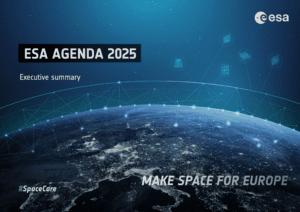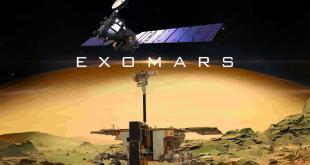by Nina Klimburg-Witjes, University of Vienna
The ESA Agenda 2025 – Opinions by members of the SichTRaum network

On April 7 this year, one month after Dr. Josef Aschbacher took office as the European Space Agency’s (ESA) new Director-General, the ESA Agenda 2025 was released.
This document contains the agenda of the new Director-General for the agency over/for the next four years. It outlines five priorities, which will have many long-term implications:
- Strengthening ESA-EU relations,
- Boosting space commercialization for a green and digital Europe,
- Developing space for safety and security,
- Addressing critical program challenges,
- Completing the internal transformation of ESA.
Although many of them come as no surprise, the urgency assigned to dealing with these priorities is unexpected – and welcome.
In this series of opinion pieces, members of the SichTRaum network provide their thoughts on some of the priorities, taking into account the broader context of the ongoing space sector transformations. SichTRaum is a network of researchers from various disciplines who look at human space exploration from the perspective of peace and security. It is an acronym for “Sicherheit und Technologie im Weltraum”, in English: “Security and Technology in Outer Space”. Find more information here.
—

Priority no 4 of the agenda – and probably the most surprising one – is to” Develop space for safety and security”. For decades, the security and military aspects of ESA´s activities have not been in the spotlight. One had to look very carefully to find any mention of security, let alone military-related activities, in ESA documents. For instance, when ESA and EU started to collaborate on Galileo in the early 2000s, the EU emphasized that Galileo as a “European system for European citizens” would give “Europe freedom in its security missions.” In turn, ESA aimed at downplaying the crucial military components of Galileo in public accounts and instead stressed the benefits for the general public, such as environmental protection and its use for science.
The reason for this is that ESA is a civilian space agency and stands for peaceful cooperation in Europe and beyond, a principle enshrined in the agency’s convention from 1975. However, the new ESA agenda boldly aims to respond to the global power shifts in the space sector and the accelerated competition with US and China – two countries known for having both a more civilian and strongly militarized approach to space. Indeed, this is not a new development: Already in 2009, commentators saw the militarization of the European Space Agency as a development of historical significance given the long-time policy taboo against space militarization.
The shift from looking to space for exploration to exploring space for its contributions to security and military operations took place vis-à-vis an increasing European integration in the security and defense sector, including setting up new policy instruments. Most important, the Lisbon Treaty in 2009 provided the basis for enhanced European defense cooperation.
In addition, the treaty introduced novel EU space competencies over security and space matters, thus providing the ground for an increased securitization of space in Europe. In 2016, the EU Global Strategy and the European Defense Action Plan (EDAP) furthered the integration of EU security and defense policy regarding values, areas and institutional actors involved. As most space technologies are dual-use, this is also reflected by the increased influence of the evolving European security and defense framework on space, the purposes and requirements of space programs, and the strategies and policies of its main actors. Without much public debate, space was now framed as a crucial component to support EU security policies, including military missions abroad. The shift to “space for security” as put forward by EU actors and followed – deliberatively or reluctantly – by ESA, has co-evolved with a shift in security thinking in Europe towards a more assertive approach to security and defense integration. In this process, the EU’s security mandate has created a need that ESA as a non-EU institution can hardly fulfil, providing the basis for the EU to claim some form of authority over ESA. In this debate, the question of dual-use technologies (in particular navigation systems and some earth observation technologies) has proven to be decisive boundary issues for an organization that initially positioned itself as “avowedly peaceful” and would always struggle to push back against.
What is new, however, is how open ESA leadership now addresses security as a priority and focal point of future projects.
The rising challenges for Europe’s security as relying on space infrastructures for navigation, observation as well as autonomous access to outer space have led the EU and ESA to take a more active stance towards security and defense. This is addressed in the agenda when it refers to the “dangers of relying on others for the provision of our societal needs” and sees strategic autonomy and technological non-dependence as being “back center stage”. But it is not only about gaining independence: With Europe so heavily relying on a functioning space infrastructure, now fears would grow that this infrastructure is being attacked, leading to calls for increased defense measures.
Yet, the question is if a civilian space agency like ESA can actually compete with countries that have long established military space programs or newly formed space forces and if that would eventually lead the EU to openly militarize its space program as well? And if so, would this not stand in conflict with ESA’s convention of using space for peaceful purposes only?
What peaceful means is ill-defined by the convention, at best and it is precisely this vagueness that provides much leeway for ESA to collaborate with and support military activities of its member states. Boundaries of security can, of course, be flexible and react to new conditions, whether these are already materializing, imagined or strategically staged. In that sense, European security takes its very meaning from what is – at a specific moment in time – a shared understanding of what both Europe and security are and what they are not. In this sense, the new agenda only follows the trajectory established by former DG Jean-Jacques Dordain, who stated in 2014 that “The ESA itself is not a civilian agency. It is an agency for peaceful purposes and may have programs with a security component. If and when Europe needs space as an enabling tool for its security and defense policy, ESA will be prepared to develop the required programs”.
Still, it can be seen as a strategic choice to further depart from the principles on which ESA was founded and which had been at least publicly rehearsed and stabilized for many decades. Some at ESA see this increased securitization of space in Europe as an “unpleasant spiral”, yet an unavoidable one, given the developments in other regions of the world and the ever-growing dependence on space infrastructures for critical security provisions. If ESA aims to respond to the global power shifts in the space sector and the geopolitical transformations more generally, the question remains whether this is best being done by strengthening ties with military institutions or if ESA could rather build on and extend its main strength and mandate – international cooperation and diplomacy. Here, it would be particularly important to consider how a stronger focus on security would impact ESA’s relation to its non-European (associated) members like as Canada. Indeed, such any exclusionary stance towards non-EU international partners would depart from ESA´s predominant civilian focus as a powerful science diplomacy instrument, that allowed – and partly enforced – civilian cooperation among partners. This powerful tool might get lost, if ESA is becomes more closely entangled with a militarized approach to space.
In light of the global transformations in the space sector, it is more crucial than ever that European space policy makers and ESA leadership engage in a transparent and public discussion about the future of European space and security strategies. In the end, how we conceptualize a “united Europe in space” has fundamental political, strategic and ethical consequences for Europe and beyond.

Dr. Nina Klimburg-Witjes is a researcher at the Department of Science and Technology Studies (STS), University of Vienna, with previous positions and fellowships at the Technical University Munich, the European Space Policy Institute and the Austrian Institute for International Affairs. Her work explores the role of technological innovation in security policies and international relations with a special focus on space technologies and cyber security. Her expertise includes satellite imagery in international security politics, space debris and forms of responsible governance and the securitization of European space policy. Klimburg-Witjes is currently writing a book about the European launcher Ariane 6 in the context of a global transformation of the space sector.





